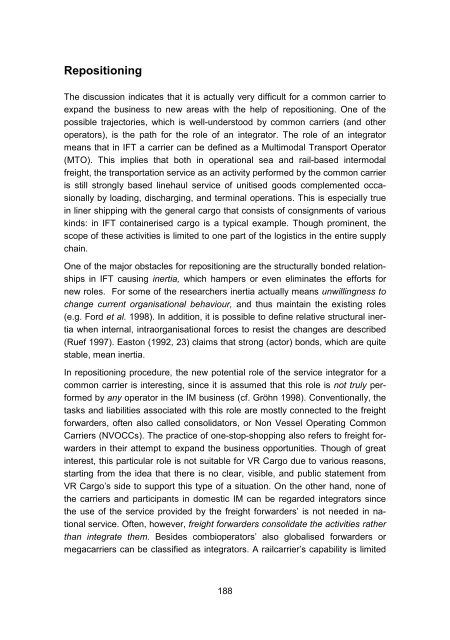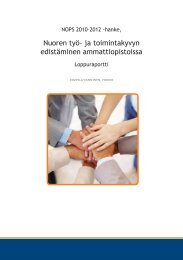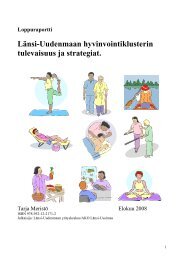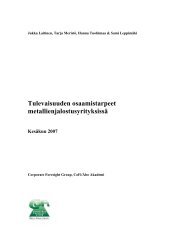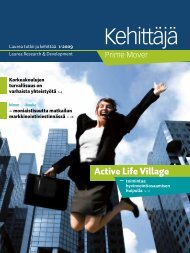849954 sisus
849954 sisus
849954 sisus
Create successful ePaper yourself
Turn your PDF publications into a flip-book with our unique Google optimized e-Paper software.
Repositioning<br />
The discussion indicates that it is actually very difficult for a common carrier to<br />
expand the business to new areas with the help of repositioning. One of the<br />
possible trajectories, which is well-understood by common carriers (and other<br />
operators), is the path for the role of an integrator. The role of an integrator<br />
means that in IFT a carrier can be defined as a Multimodal Transport Operator<br />
(MTO). This implies that both in operational sea and rail-based intermodal<br />
freight, the transportation service as an activity performed by the common carrier<br />
is still strongly based linehaul service of unitised goods complemented occasionally<br />
by loading, discharging, and terminal operations. This is especially true<br />
in liner shipping with the general cargo that consists of consignments of various<br />
kinds: in IFT containerised cargo is a typical example. Though prominent, the<br />
scope of these activities is limited to one part of the logistics in the entire supply<br />
chain.<br />
One of the major obstacles for repositioning are the structurally bonded relationships<br />
in IFT causing inertia, which hampers or even eliminates the efforts for<br />
new roles. For some of the researchers inertia actually means unwillingness to<br />
change current organisational behaviour, and thus maintain the existing roles<br />
(e.g. Ford et al. 1998). In addition, it is possible to define relative structural inertia<br />
when internal, intraorganisational forces to resist the changes are described<br />
(Ruef 1997). Easton (1992, 23) claims that strong (actor) bonds, which are quite<br />
stable, mean inertia.<br />
In repositioning procedure, the new potential role of the service integrator for a<br />
common carrier is interesting, since it is assumed that this role is not truly performed<br />
by any operator in the IM business (cf. Gröhn 1998). Conventionally, the<br />
tasks and liabilities associated with this role are mostly connected to the freight<br />
forwarders, often also called consolidators, or Non Vessel Operating Common<br />
Carriers (NVOCCs). The practice of one-stop-shopping also refers to freight forwarders<br />
in their attempt to expand the business opportunities. Though of great<br />
interest, this particular role is not suitable for VR Cargo due to various reasons,<br />
starting from the idea that there is no clear, visible, and public statement from<br />
VR Cargo’s side to support this type of a situation. On the other hand, none of<br />
the carriers and participants in domestic IM can be regarded integrators since<br />
the use of the service provided by the freight forwarders’ is not needed in national<br />
service. Often, however, freight forwarders consolidate the activities rather<br />
than integrate them. Besides combioperators’ also globalised forwarders or<br />
megacarriers can be classified as integrators. A railcarrier’s capability is limited<br />
188


